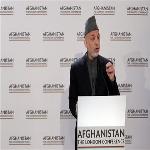28 January 2010

Photo: AP
Afghan President Hamid Karzai makes a speech during the Opening Session of the Afghanistan Conference in London, 28 Jan 2010
Afghan President Hamid Karzai told delegates to a London conference Thursday that he needed regional cooperation for his effort to reintegrate elements of the Taliban back into Afghan society. Delegates to the Afghan conference expressed support for the idea, but analysts say the plan will be a tough sell in the region.
The Afghan response regarding this most recent international conference is one of cautious optimism, especially after eight years of heavy fighting.
Law and Political Science Professor Wadir Safi at Kabul University says that while he does not expect the conference to solve the Afghan problem, it could be the catalyst to bringing peace. "The London conference can open the gate toward those Taliban who are fighting to come to peace, [and] it would be [a] big achievement," he said.
Reintegration
The countries attending the conference have pledged more than $140 million to a fund designed to reintegrate Taliban militants willing to lay down their weapons.
Abdul Hakeem Mujahid was the envoy to the United Nations for Afghanistan's Taliban government. He tells VOA from Kabul that he believes this offer of money will not work.
"Unfortunately, it is not the language of reconciliation," said Mujahid. "It is not the language of reintegration."
But he says President Karzai's plea to Saudi Arabia and Pakistan to help with the peace process is a smart move. "If there is no confidence and transparency with the regional countries and neighboring countries, I think any kind of reconciliation will be [impossible]," said Mujahid.
Key role player
International Relations Associate Professor Ishtiaq Ahmad at the Quaid-i-Azam University in Islamabad says Pakistan is key to any sort of peace dialogue in Afghanistan.
"All of this historical, ethnic, religious and geographic sectors, makes Pakistan's role I think the most crucial in solving the Afghan conflict," he said.
He says that not only was Pakistan one of the few countries that officially recognized Afghanistan's previous Taliban government, but it also shares a concern for the Pashtun people who live in both countries.
"Taliban are predominately Pashtun, and Pashtuns reside on both sides of the Durand Line, so naturally Pakistan has some sort of clout on these Taliban groups," he said.
Ahmad also points out that the Pakistani government has experience in negotiating peace deals with Taliban militants within its own borders.
"Pakistan [has] cut some deals with some of the Taliban groups, allegedly with those groups which are active in insurgencies in Afghanistan," he said.
Washington has pushed Islamabad to go after the sanctuaries for these Taliban elements hiding out in Pakistan. But the Pakistani government has resisted, saying that dialogue with militants is the best path for peace in Afghanistan.